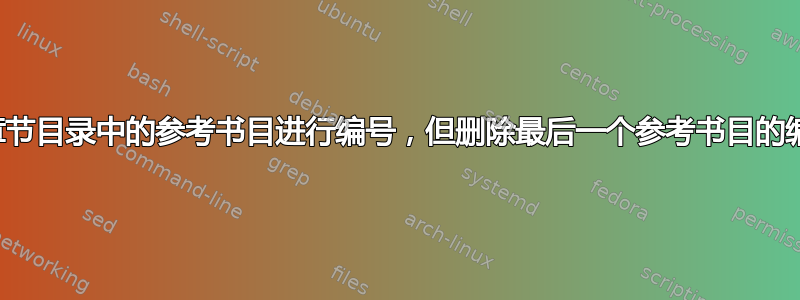
我将各个章节放在一起(使用\include{}),每个章节都有一个参考书目
\documentclass[12pt,oneside]{report}
\usepackage[nottoc,numbib]{tocbibind}
\usepackage{setspace}
\usepackage[round, sectionbib]{natbib}
\begin{document}
\tableofcontents
\chapter{Yo the yo}
\citep{Grant1999}
\bibliographystyle{chicago}
\bibliography{thesis}
\appendix
\chapter{My appendix shall not be removed}
\bibliographystyle{chicago}
\bibliography{thesis}
% \addcontentsline{toc}{section}{Bibliography}
\cleardoublepage
\chaptermark{{Bibliography}}
% \chapter{Bibliography}
\addcontentsline{toc}{chapter}{Bibliography}
\bibliography{thesis}
\end{document}
由此得出:
和这个:
最终的参考书目(经过编辑如下所示):
@book{Grant1999,
Address = {Princeton, New Jersey},
Author = {Grant, Peter Raymond},
Isbn = {0691084289 9780691084282},
Publisher = {Princeton University Press},
Rating = {5},
Title = {{Ecology and evolution of Darwin's finches}},
Year = {1999}
}
答案1
单独使用时,“chapterbib”选项[sectionbib]将\section*用于部分参考书目,但保留\chapter*整个文档的参考书目。
软件包“tocbibind”和“natbib”都通过将控制权分离在命令中来更改参考书目部分,使其更容易更改,\bibsection但它们不关注区分不同参考书目的文件的状态。最简单的解决方案是在整体(最终)参考书目之前\include重新定义\bibsection
\renewcommand\bibsection{\chapter*{\bibname}}
\chaptermark这很好地回答了在何处明确使用和的问题\addcontentsline。将这些簿记命令移到修订后的\bibsection
\renewcommand\bibsection{\chapter*{\bibname}%
\chaptermark{\bibname}%
\addcontentsline{toc}{chapter}{\bibname}%
}
但这并不能节省任何输入。





